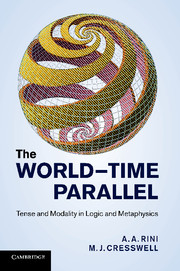Book contents
5 - A formal language
from PART II - PREDICATE LOGIC: TENSE AND MODAL
Published online by Cambridge University Press: 05 March 2012
Summary
The principal theme of Part II of this book is that an adequate appreciation of the world–time parallel demands the resources of formal logic, and the purpose of this chapter is to set out a description of a language of modal and tense logic, and provide an indexical semantics for it. The chapter presents fairly standard material, and can be omitted by those who are familiar with intensional predicate logic. It does, however, establish our notation, and will provide a reference chapter for later passages in which we present material in ways which might otherwise appear sloppy. In discussing these formal languages we shall not be concerned with axiomatising their logic, but solely with a presentation of an indexical semantics. We shall first set out a description of the languages of (untensed and non-modal) firstorder predicate logic. We shall then show how they can be extended to become formalised tense and modal predicate languages. The notation and terminology we shall use is from Hughes and Cresswell 1996.
In specifying a formal language we first provide a list of its primitive symbols, and then a mechanism for specifying which finite sequences of these symbols count as well-formed formulae (wff). A language L of the (first-order or lower) predicate calculus (LPC) contains as primitive symbols
(a) For each natural number n (≥ 1) a set of n-place predicates ϕ, ψ, χ, … etc., where this set is possibly finite, or even empty for some n, but at most denumerably infinite.
- Type
- Chapter
- Information
- The World-Time ParallelTense and Modality in Logic and Metaphysics, pp. 51 - 61Publisher: Cambridge University PressPrint publication year: 2012



